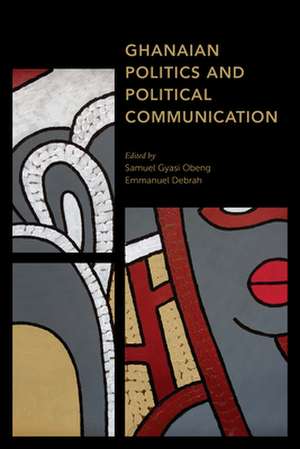Ghanaian Politics and Political Communication: Africa: Past, Present & Prospects
en Limba Engleză Hardback – 22 aug 2019
Din seria Africa: Past, Present & Prospects
- 27%
 Preț: 774.95 lei
Preț: 774.95 lei -
 Preț: 375.61 lei
Preț: 375.61 lei - 27%
 Preț: 809.38 lei
Preț: 809.38 lei - 27%
 Preț: 809.21 lei
Preț: 809.21 lei - 27%
 Preț: 807.40 lei
Preț: 807.40 lei - 27%
 Preț: 781.82 lei
Preț: 781.82 lei - 27%
 Preț: 808.66 lei
Preț: 808.66 lei - 27%
 Preț: 755.73 lei
Preț: 755.73 lei - 27%
 Preț: 672.89 lei
Preț: 672.89 lei -
 Preț: 301.31 lei
Preț: 301.31 lei -
 Preț: 344.35 lei
Preț: 344.35 lei - 27%
 Preț: 736.97 lei
Preț: 736.97 lei -
 Preț: 344.05 lei
Preț: 344.05 lei - 23%
 Preț: 589.10 lei
Preț: 589.10 lei - 23%
 Preț: 588.98 lei
Preț: 588.98 lei - 27%
 Preț: 740.20 lei
Preț: 740.20 lei -
 Preț: 343.42 lei
Preț: 343.42 lei - 23%
 Preț: 589.63 lei
Preț: 589.63 lei - 27%
 Preț: 698.89 lei
Preț: 698.89 lei - 27%
 Preț: 701.09 lei
Preț: 701.09 lei - 27%
 Preț: 698.55 lei
Preț: 698.55 lei - 27%
 Preț: 674.76 lei
Preț: 674.76 lei - 27%
 Preț: 769.28 lei
Preț: 769.28 lei
Preț: 815.04 lei
Preț vechi: 1116.50 lei
-27% Nou
Puncte Express: 1223
Preț estimativ în valută:
155.95€ • 162.83$ • 129.07£
155.95€ • 162.83$ • 129.07£
Carte tipărită la comandă
Livrare economică 04-18 aprilie
Preluare comenzi: 021 569.72.76
Specificații
ISBN-13: 9781786613691
ISBN-10: 1786613697
Pagini: 288
Dimensiuni: 152 x 229 x 29 mm
Greutate: 0.63 kg
Editura: Rowman & Littlefield
Seria Africa: Past, Present & Prospects
ISBN-10: 1786613697
Pagini: 288
Dimensiuni: 152 x 229 x 29 mm
Greutate: 0.63 kg
Editura: Rowman & Littlefield
Seria Africa: Past, Present & Prospects
Notă biografică
Samuel Gyasi Obeng is Professor of Linguistics at Indiana University-Bloomington (USA). He is also an affiliated faculty in the School of Global and International Studies and a faculty of Indiana University¿s Honors Program.
Emmanuel Debrah is Associate Professor in the Department of Political Science and Director of the Legon Center for International Affairs and Diplomacy at the University of Ghana. He specializes in electoral and party politics, local government and decentralization, public policy, and democratic governance.
Cuprins
Prologue
Preface and Acknowledgments
Dedication
Chapter 1. Introduction
Samuel Gyasi Obeng and Emmanuel Debrah
PART ONE: GHANAIAN POLITICS
Chapter 2. Ghanäs Political Environment and the 2016 General Election
Emmanuel Debrah, University of Ghana
Chapter 3. Election Campaign in Ghanäs 2016 National Elections
Seidu Alidu, University of Ghana
Chapter 4. Communicating with the Electorate in the 2016 Elections: Did the Political Parties and their Candidates Lean on the Issues?
Richard Asante, University of Ghana
Chapter 5.(Mis)Coordination: Why Would Ghanaian Political Actors and Political Parties Encourage Split-Ticket Voting?
Samuel Darkwa, University of West Virginia
Chapter 6. Are Members of Parliament in Ghana Responsive to their Constituents in Policy Making? Evidence from the National Health Insurance Scheme
Hassan Wahab, University of Ghana
PART TWO: GHANAIAN POLITICAL COMMUNICATION
Chapter 7. When Government Is Unaware It Is Incommunicado
Margaret I. Amoakohene and Kwasi Ansu-Kyeremeh, University of Ghana
Chapter 8. Pragmatic Analysis of First Person Pronoun Deixes in President Nana Akuffo Addös 2018 State of the Nation¿s Address (SONA)
Kofi Agyekum, University of Ghana
Chapter 9. Discursive Construction of the Representative Claim in UK and Ghanaian Parliamentary Discourse
Kwabena Sarfo Sarfo-Kantankah, University of Cape Coast
Chapter 10. How Much Communication is in Ghanaian Presidents¿ State of the Nation Addresses?
Margaret I. Amoakohene, University of Ghana
Chapter 11. Power, Domination and Manipulation in Students¿ Parliamentary Discourse in Ghanaian University
Dora F. Edu-Buandoh and Nancy Boahemaa Nkansah, University of Cape Coast
Chapter 12. The Role of Music in Ghanaian Political Communication
Kofi Agyekum, Joshua Alfred Amuah and Hilarius Mawutor Wuaku, University of Ghana
Chapter 13. President Akufo-Addös Address to the Nation on the US-Ghana Military Co-operation Agreement: A Political Communicative Functional and Framing Analytic Approach
Etse Sikanku, Frank Kofi Boadi, Halisa Aziz and Nana Kwame Osei Fordjour, University of Ghana
Chapter 14. Language and Liberty in the Ghanaian Political Ecology: A Brief Overview
Samuel Obeng, Indiana University
Epilogue
Author Information
Descriere
Provides an understanding of the importance of elections in democratization and the constitution of order.
